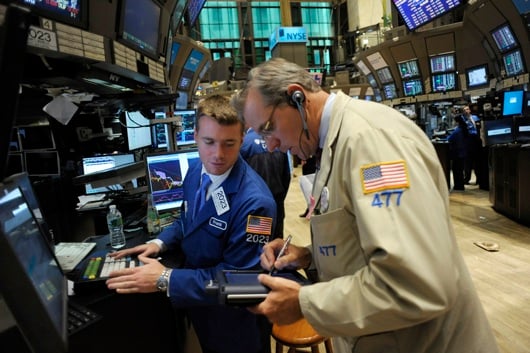Analysts continue to cut their their price predictions for large caps despite hefty corporate profits. One even went so far as to raise his projections for large-cap earnings, but lowered his estimates for the S&P 500 | <b>Extra</b> <a href=http://www.investmentnews.com/apps/pbcs.dll/gallery?Site=CI&Date=20111003&Category=FREE&ArtNo=100309999&Ref=PH>Reasons to be cheerful/fearful about stocks</a>
Oppenheimer & Co., HSBC Holdings Plc (HSBA) and Barclays Plc cut estimates for the Standard & Poor's 500 Index, citing Europe's debt crisis and U.S. budget battles.
Brian Belski, chief investment strategist at Oppenheimer, cut his year-end 2012 forecast for the benchmark equity gauge to 1,400 from 1,475 and his profit forecast for next year to $101 a share from $112. He also lifted his projection for earnings this year to $96 from $94. Garry Evans, head of global equity strategy at HSBC, slashed his prediction for the S&P 500's close in 2011 by 21 percent to 1,130. Barclays's Barry Knapp reduced his 2011 forecast for the index to 1,260 from 1,326 and his 2012 earnings estimate to $102 from $105.
“Against a backdrop of slowing global growth, ongoing sovereign debt issues in Europe, uncertainty regarding U.S. fiscal and regulatory policies and anemic labor market growth, the market is likely to struggle for longer-term gains,” New York-based Belski wrote in a note dated Oct. 7.
Concern European officials will fail to contain the region's debt crisis and the global economy will slip into a recession has wiped about $10 trillion from world equity markets. The S&P 500 fell below 1,100 for the first time in more than a year last week, sending the measure within 1 percent of a bear market, and climbed 3.4 percent to 1,194.89 today. U.S. stocks are trading at about 13 times earnings, close to the lowest levels since March 2009.
‘Continue to Fret'
“It is not clear the world is going into recession but markets will continue to fret about this,” Hong Kong-based Evans wrote in a note. “In this environment, catalysts will matter more than valuations.”
A team at Morgan Stanley Smith Barney lowered its recommendations for riskier holdings while boosting ratings for assets considered “safe havens” such as bonds and cash. A team led by Chief Investment Officer Jeff Applegate and Chief Investment Strategist David Darst cut their ratings for global equities to “underweight” from “overweight', citing the increasing risk of a recession in the U.S. and the rest of the developed world.
‘‘This is the most significant change to our tactical asset allocation in more than two years, as we are decisively moving to bearish from bullish,'' the Morgan Stanley note said. ‘‘The primary source of the recent financial market distress -- with, we think, more to come -- has been a combination of policy inaction and ineptness in the U.S. and Europe.''
The firm also lowered its recommendations for commodities and real estate investment trusts to ‘‘underweight'' from ‘‘overweight,'' while raising bonds to ‘‘marketweight'' from ‘‘underweight'' and cash to ‘‘overweight'' from ‘‘underweight.''
--Bloomberg News--







